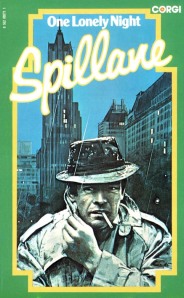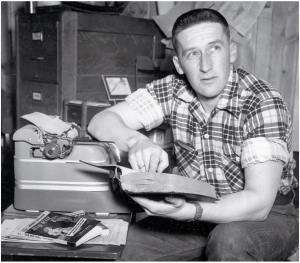Book Club: Mickey Spillane
“Everything started to come out right then, even the screwy test they put me through. A small-time setup like this was hardly worth the direct attention of a Moscow man unless something was wrong, so I had to prove myself.
Smart? Sure, just like road apples that happen behind horses.”
Mickey Spillane- One Lonely Night
by Matt Keleher
For much of his lifetime, Mickey Spillane was the first name in ‘hard-boiled’ crime fiction. In today’s Book Club, I give my readers the skinny on one of his best-loved novels, ‘One Lonely Night’ and the man himself.
Author Profile
Frank Morrison Spillane, (aka Mickey) cut his teeth as a comic book writer in the early 40s, contributing stories for cherished characters such Captain America, Superman and Batman to name but a few. Spillane would later discover his true niche writing ‘hard-boiled’ fiction; the pulpy, noir-soaked underworlds depicted in his novels were filled with crooked cops, femme fatales , lawless mobsters and usually a renegade PI with no qualms about bending a few rules if it earned him his pay check.
While it could be said Spillane’s novels are sparse on introspection, life lessons and character development, they more than compensate for these shortcomings with bloody, gratuitous violence. His stylistic choices predictably earned him a mauling from many a literary critic; in response to his detractors, Spillane remarked:
“Those big-shot writers could never dig the fact that there are more salted peanuts consumed than caviar…If the public likes you, you’re good.”
It seems he had the last laugh; his novels have sold more than 225 million copies world-wide and his work remains a perennial influence in the sphere of contemporary crime fiction. Prominent figures who praised Spillane’s writing include Russian-American novelist Ayn Rand and (surprisingly) Jackie Collins who professed her admiration in a recent interview with The Guardian.
One Lonely Night
 In One Lonely Night, Spillane’s luckless gumshoe Mike Hammer begins his third adventure as he means to go on. From the get-go, he’s in deep shit; having gunned down a perp in self-defence, Hammer is hauled before a judge. While avoiding a sentence, pleading self-defence, the judge makes no effort to hide his contempt for the reckless PI’s destructive ways, delivering a stern lecture before turfing Hammer back onto the mean streets.
In One Lonely Night, Spillane’s luckless gumshoe Mike Hammer begins his third adventure as he means to go on. From the get-go, he’s in deep shit; having gunned down a perp in self-defence, Hammer is hauled before a judge. While avoiding a sentence, pleading self-defence, the judge makes no effort to hide his contempt for the reckless PI’s destructive ways, delivering a stern lecture before turfing Hammer back onto the mean streets.
Alone with his thoughts, Hammer decides to take a stroll as he cools off. While crossing a bridge in a bad neighbourhood, he encounters a hysterical young woman in the midst of pursuit by an armed thug. What said thug didn’t count on was Hammer filling his guts with lead before he reached his target. Hammer turns around to find the girl dangling from the bridge and rushes to save her, but in spite of his efforts she plummets to her death. His only memento from the affair was a pack of smokes containing an ominous green card. This sole, cryptic clue leads him to the heart of a sinister Communist plot (the book was published at the height of America’s ‘red scare’) which our intrepid anti-hero resolves to thwart with very little outsider help.
This is noir at its purest; there’s little respite from the foreboding realm of claustrophobic alleys, dim warehouses and sawdust littered apartments – and all the better for it:
“The rain was misty enough to be almost fog-like, a cold grey curtain that separated me from the pale ovals of white that were face locked behind the steamed-up windows of the cars that hissed by…I walked and I smoked and I flipped the spent butts ahead of me and watched them arch to the pavement and fizzle out with one last wink.”
Apparently unaffected by the dreaded ‘writer’s block’ Spillane was surely the envy of his contemporaries; he never re-wrote anything. This allowed him to turn over a novel in a matter of weeks. While other writers agonise over whether their fickle critics will howl over a clunky sentence, Spillane sat through a shift at the typewriter without giving a rat’s ass whether the press liked what he wrote.
He knew what his readers wanted however and if you find yourself clamouring for a fix of tough noir, One Lonely Night could be just the ticket.

